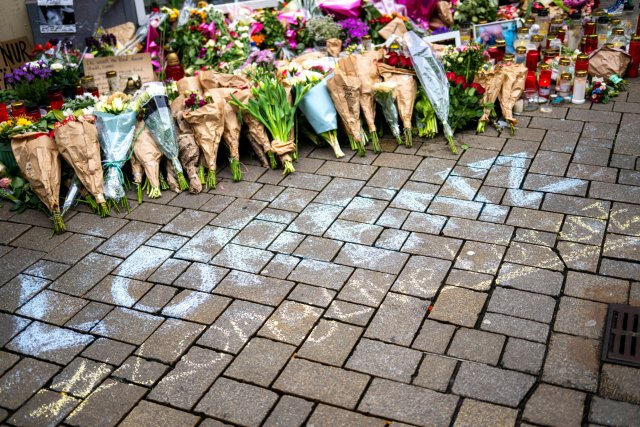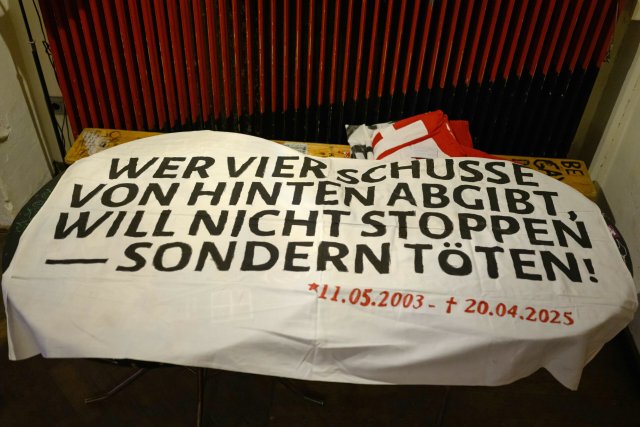Lorenz A. | Fatal police shooting: Uprising for Lorenz in Oldenburg
"They shot him. My brother was shot in the back by the police. I want you to understand what this means," Ihsan, a close friend of Lorenz A., calls out to the audience at the Oldenburg horse market. His voice is calm, yet filled with pain. On Friday evening, around 10,000 people gather in the square – less than a week after the young Black German was killed by police bullets.
Lorenz A. was only 21 years old. He was killed by a police officer's bullets on the night of Easter Sunday. How exactly this deadly escalation occurred is likely on the minds of many in Oldenburg these days. One thing is certain: the officer fired at least four shots at the young man from Oldenburg. Three bullets struck Lorenz from behind—in the hip, upper body, and head—and a fourth grazed his thigh—this shot, too, may have been fired from behind.
Lorenz succumbed to his injuries in the hospital shortly afterward – since then, hardly anything in Oldenburg has been the same. According to current information, the young man got into an argument outside a club on the night of the incident. He was subsequently pursued by bouncers and patrons, spraying pepper spray. He is also said to have wielded a knife, which is why his pursuers apparently abandoned him.
Lorenz fled through Oldenburg's busy city center on Easter weekend. Police eventually caught him in a side street. According to an initial report, he approached officers in a "threatening" manner. Social media reports subsequently suggested that Lorenz A. was also holding the knife in question. However, this knife—or another one—was in his trouser pocket at the time the shot was fired, as the public prosecutor's office has now confirmed.

"We stand here today to mourn – and to be loud. Loud for clarification and justice!" shouted an organizer of the Justice for Lorenz initiative into the microphone on Friday evening. Behind her on the small stage stood other friends of the deceased, visibly overwhelmed by the outpouring of sympathy and what they had gone through in the past few days.
On the stage at the Pferdemarkt, friends, supporters, and relatives of similar victims take turns speaking. Sidy Dramé, brother of Mouhamed Dramé, who was shot dead in Dortmund in 2022, also delivers a speech. Following him is Mamadou Saliou Diallo, brother of Oury Jalloh, who was allegedly killed by police in Dessau in 2005.
The speeches on the stage at the Pferdemarkt paint a picture of Lorenz A. as a person, contrasting with the anonymous "21-year-old" from the initial police and press reports. "Lorenz was a person with a heart, with dreams, with a soul that this world needed," says Ihsan, visibly fighting back tears.
Ellen, a close friend of the family, speaking on behalf of Lorenz's mother, finds words that are both moving and shocking. "Lorenz's mother cannot be here today. She cannot eat, she cannot sleep. Everything she has ever lived for has been taken away from her," she reports in a choked voice. Many in the audience quietly join in the tears. She expresses her sincere gratitude for the solidarity – for the friends who have been keeping watch at the scene of the accident for five days now. Some of them even "washed his blood off the street on Sunday morning" – an image that conveys the depth of shock felt by the community gathered on stage.
A mixture of deep pain and grateful solidarity characterizes the mood of the rally, until a demonstration begins, initially slightly chaotic, then powerful. Thousands of people march from the Pferdemarkt through the city center – significantly more than the 1,500 originally expected. In terms of spontaneity and scale, such a protest in direct response to fatal police shootings is likely unprecedented nationwide for a long time.
"We are committed to a strong, peaceful sign of solidarity – for justice, for truth, for humanity," the family said in a statement beforehand, distributed by the "Justice for Lorenz" initiative. The police are indeed staying in the background, with uniformed officers barely visible during the rally. A success of communication between the demonstration leadership and the police, as organizers told "nd." Neither side seems interested in further escalation.

Many demonstrators had hoped that city representatives would appear and answer their questions. But Oldenburg's mayor, Jürgen Krogmann (SPD), was a no-show. Many felt let down by him in particular: Just the day before, Krogmann had made a reassuring appeal and assured them that they could speak to him at any time. However, the city's leadership then responded with only a brief social media post expressing condolences and referring to ongoing investigations.
While the protests on the streets become unmistakable and the sea of flowers, candles, and letters at the crime scene in the pedestrian zone continues to grow, the investigation is ongoing. The Oldenburg public prosecutor's office has – unlike in many similar cases – initiated proceedings against the shooter on suspicion of manslaughter from the outset.
The fact that the authorities are investigating more than just bodily harm resulting in death demonstrates how seriously the investigating public prosecutor, Eva Bredel, is taking the case. On Tuesday afternoon, immediately after the autopsy results were available, she informed the public that the shots struck Lorenz A. from behind.
Whether the case will even lead to prosecution is questionable, however: In Germany, there have been few criminal trials against police officers for manslaughter to date. In the currently most well-known case of this kind – the proceedings against a Dortmund officer following the death of Mouhamed Dramé – the trial in the first instance ended in an acquittal last December.

nd-aktuell




